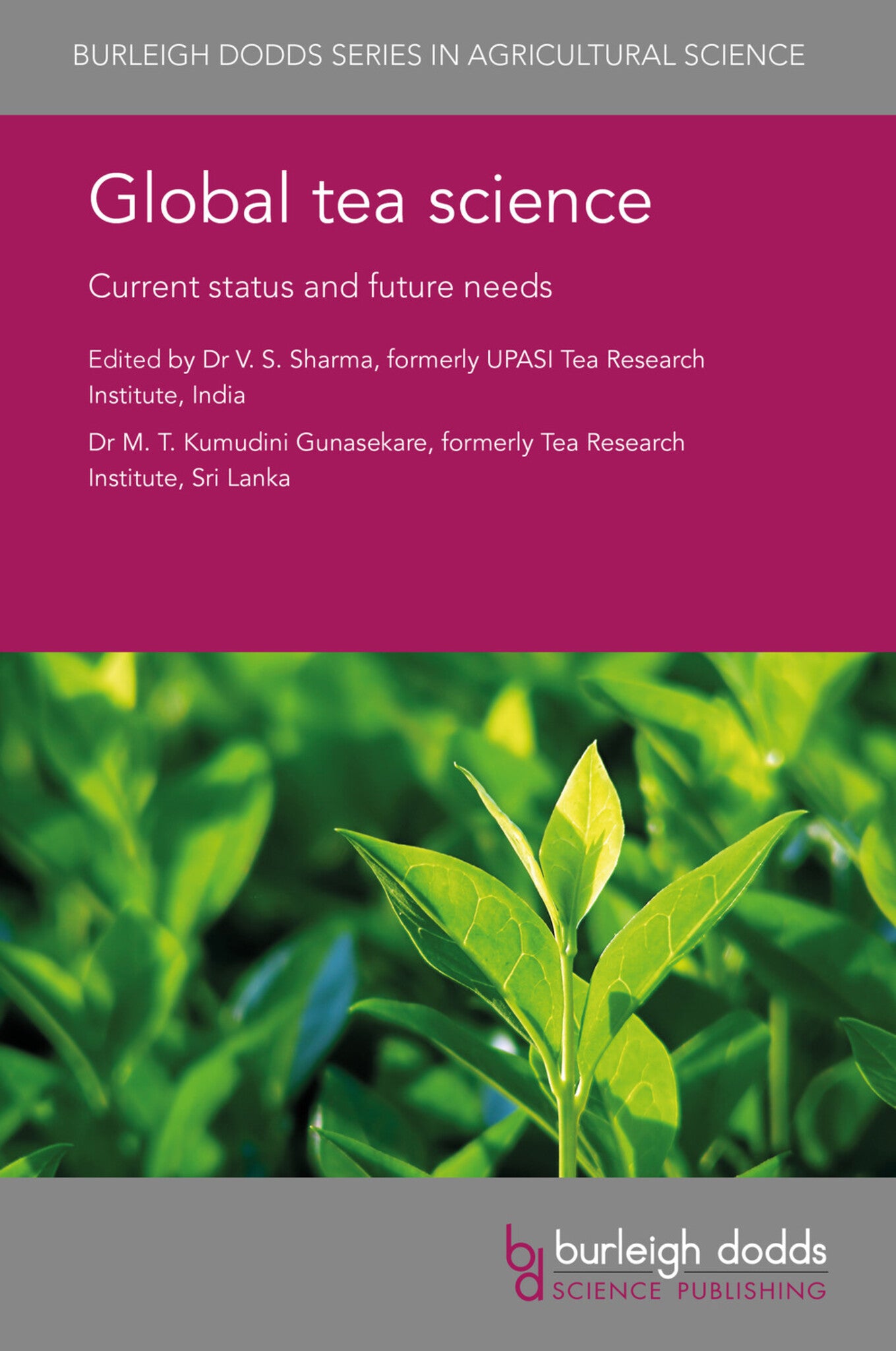We're sorry. An error has occurred
Please cancel or retry.
Global tea science

Some error occured while loading the Quick View. Please close the Quick View and try reloading the page.
Couldn't load pickup availability
- Format:
-
20 February 2018

- Reviews the latest advances in understanding tea genetics and genetic diversity and how this has informed advances in conventional, marker-assisted and transgenic breeding techniques
- Summarises current best practice in cultivation techniques and the control of pests and diseases
- Focuses on assessing the environmental impact of tea cultivation

TECHNOLOGY & ENGINEERING / Agriculture / Sustainable Agriculture, Food and beverage technology, TECHNOLOGY & ENGINEERING / Agriculture / Agronomy / Crop Science, TECHNOLOGY & ENGINEERING / Food Science / General, TECHNOLOGY & ENGINEERING / Pest Control, Food and beverage safety, Food and beverage processing and engineering, Sustainable agriculture, Agronomy and crop production, Smallholdings, Pest control / plant diseases

Part 1 Tea Breeding and Germplasm
1.Ensuring the genetic diversity of tea: Jian-Qiang Ma and Liang Chen, Tea Research Institute of the Chinese Academy of Agricultural Sciences (TRI, CAAS), China;
2.Mapping and exploiting the tea genome: Xinchao Wang, Xinyuan Hao, Lu Wang and Yajun Yang, Tea Research Institute of the Chinese Academy of Agricultural Sciences (TRI, CAAS), China;
3.Advances in genetic modification of tea: Mainaak Mukhopadhyay, University of Kalyani, India; Tapan Kumar Mondal, National Bureau of Plant Genetic Resources, India;
Part 2 Cultivation and Agronomy
4.Planting and cultivation of tea: M. A. Wijeratne, Tea Research Institute, Sri Lanka;
5.The effect of cultivation techniques on tea quality: P. Okinda Owuor, Maseno University, Kenya;
6.The role of arbuscular mycorrhizal fungi in tea cultivation: Shipra Singh and Anita Pandey, G. B. Pant National Institute of Himalayan Environment and Sustainable Development, India; and Lok Man S. Palni, Graphic Era University, India;
7.The role of microbes in tea cultivation: P. N. Bhattacharyya and S. R. Sarmah, Tocklai Tea Research Institute, India;
Part 3 Plant Protection
8.Diseases affecting tea plants: G. D. Sinniah, Tea Research Institute, Sri Lanka;
9.Insect pests of tea: shot-hole borers, termites and nematodes: Nalini C. Gnanapragasam, Former Deputy Director (Research), Tea Research Institute, Sri Lanka; currently Agricultural Tea Consultant - Malwatte Valley Plantations PLC, Sri Lanka;
10.Insect pests of tea: caterpillars and other seasonal, occasional and minor pests: Nalini C. Gnanapragasam, Former Deputy Director (Research), Tea Research Institute, Sri Lanka; currently Agricultural Tea Consultant - Malwatte Valley Plantations PLC, Sri Lanka;
11.Integrated pest management of tea insect pests: Nalini C. Gnanapragasam, Former Deputy Director (Research), Tea Research Institute, Sri Lanka; currently Agricultural Tea Consultant - Malwatte Valley Plantations PLC, Sri Lanka;
12.Pesticide residues in tea: challenges in detection and control: A. K. Barooah, Tocklai Tea Research Institute, India;
Part 4 Tea Chemistry and Phytochemicals
13.Instrumentation and methodology for the quantification of phytochemicals in tea: Ting Zhang, China University of Geosciences and Huanggang Normal University, China; Xiaojian Lv, Yin Xu, Lanying Xu and Tao Long, Huanggang Normal University, China; Chi-Tang Ho, Rutgers University, USA; and Shiming Li, Huanggang Normal University, China and Rutgers University, USA;
14.The potential role for tea in combating chronic diseases: Chung S. Yang, Rutgers University, USA;
Part 5 Sustainability
15.Tea cultivation under changing climatic conditions: Wenyan Han, Xin Li, Peng Yan, Liping Zhang and Golam Jalal Ahammed, Tea Research Institute of the Chinese Academy of Agricultural Sciences (TRI, CAAS), China;
16.Assessing and reducing the environmental impact of tea cultivation: Thushari Lakmini Wijeratne, Tea Research Institute, Sri Lanka;
17.Cultivation, production and marketing of organic tea: Nikhil Ghosh Hajra, Organic Tea and Agri-horticultural Consulting, India;
18.Supporting smallholders in tea cultivation: Atik Dharmadi, Research Institute for Tea and Cinchona, Indonesia;



